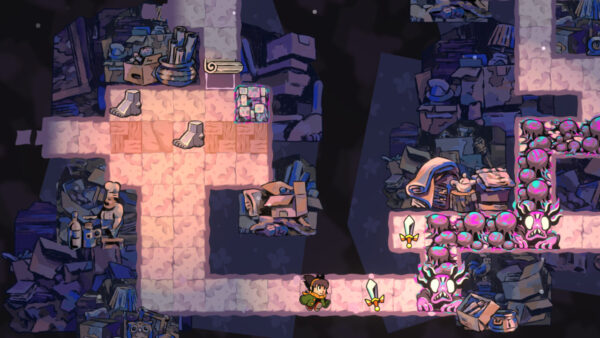Also on: PS5, Nintendo Switch
Publisher: Furniture & Mattress
Developer: Furniture & Mattress
Medium: Digital
Players: 1
Online: No
ESRB: E
Arranger is an interesting take on the puzzle genre. On the one hand, it’s not like any other puzzle game I’ve ever played: rather than controlling characters or objects, you’re controlling the ground on which they all exist, and you have to move that around to achieve your goals.
On the other hand, Arranger kind of evokes a type of puzzle that’s been around for well over a century: the sliding puzzle, where you have to move tiles around to figure out the solution. Obviously Arranger is much more complex in the sense that you’re not just figuring out one puzzle but rather a whole series of them – broadly speaking, though, the general idea isn’t that far off.
Which, I suppose, is probably why I didn’t love Arranger. As someone who’s always got bored of sliding puzzles pretty quickly, having an entire game essentially built around the concept left me a little cold. There were too many ways you could slide yourself into a corner (literally, in some cases), and not enough leeway to undo your mistakes.
Admittedly, that’s sort of the fun and the challenge of puzzle games, so I don’t want to criticize Arranger too much for that. And what’s more, it’d be silly to complain about the game’s core mechanic simply because of what it is, without any substance beyond that. But far too often, I’d find myself making one wrong move and realizing it immediately, only to be stuck with my error while I painstakingly fixed it. Indeed, one time I got myself so mixed up, I ended up quitting the game mid-level and hoping that the game hadn’t auto-saved since I’d screwed everything up. (It hadn’t, but the lack of an obvious save system is another of my complaints about Arranger.)
That said, even if I didn’t love the sliding mechanic, it still allows for some fun moments. For instance, you attack monsters not by grabbing a sword and running at them, but by sliding the sword at them until it hits. Likewise, you unlock doors by sliding keys into them, and bringing items from one spot to another by moving them tile by tile. Obviously I found it a little more tedious than the usual method of moving items (that is, picking them up and carrying them), but it definitely had its moments.
Another area where the game has its moments: in its storytelling. Even if Arranger has a pretty standard story about a young person learning about loneliness and media manipulation and whatnot that occasionally feels a little hackneyed, it’s still got such a positive attitude that you can never really get that annoyed by any of it.
Still, Arranger has enough flaws that I can’t say I love it, either. There are good ideas, and occasionally very good execution, but on the whole none of it feels like it ever clicks into a coherent, must-play whole.
Furniture & Mattress provided us with an Arranger: A Role-Puzzling Adventure PC code for review purposes.




